- Home
- David Brin
Otherness Page 18
Otherness Read online
Page 18
The screen rippled, then suddenly came alight.
Light! Jason had to shield his eyes. Hyperspace was ablaze with light!
His thoughts whirled. Could this have something to do with the threat? The unknown, malign force that had killed all the previous crews?
Jason cracked an eyelid and lowered his arm slightly. The screen was bright, but now that his eyes had adapted, it wasn't painful to look at. He gazed in fascination on a scene of whirling pink and white, as if the ship was hurtling through an endless sky of bright, pastel clouds.
It looked rather pleasant, in fact.
This is a threat? He wondered, dazedly. How could this soft brilliance kill . . . ?
Jason's jaw opened as a relay seemed to close in his mind. He stared at the screen for a long moment, wondering if his growing suspicion could be true.
He laughed out loud—a hard, ironic laugh, as yet more tense than hopeful. He set to work finding out if his suspicion was right, after all.
6.
The Lightship cruised on autopilot until at last it came to rest not far from its launching point. Little tugs approached gently and grappled with the black globe, pulling it toward the derricks where the inspection crew waited to swarm aboard. In the station control center, technicians monitored the activity outside.
"I am proceeding with routine hailing call," the communications technician announced, sending a metal tentacle toward the transmit switch.
"Why bother?" another mechano-cryo tech asked. "There certainly isn't anyone aboard that death ship to hear it."
The comm officer did not bother answering. He pressed the send switch. "This is Lightprobe Central to Lightprobe Nine. Do you read, Lightprobe Nine?"
The other tech turned away in disgust. He had already suspected the comm officer of being a closet Ethicalist. Imagine, wasting energy trying to talk to a month-dead organic corpse!
"Lightprobe Nine, come in. this is . . ."
"Lightprobe Nine to Lightprobe Central. This is Oral Witness Engineer Jason Forbs, ready to relinquish command to inspection crew."
The control room was suddenly silent. All the techs stared at the wall speaker. The comm officer hovered, too stunned to reply.
"Would you let my wife know I'm all right?" the voice continued. "And please have station services bring over something cool to drink!"
The tableau held for another long moment. At last, the comm officer moved to reply, an undisciplined tone of excitement betrayed in his voice.
"Right away, Witness Engineer Forbs. And welcome home!"
At the back of the control room a tech wearing a globe-form body hurried off to tell the director.
7.
A crowd of metal, ceramic, and cyborg-flesh surrounded a single, pale Old Style human, floating stripped to his shorts, sipping a frosted squeeze-tube of amber liquid.
"Actually, it's not too unpleasant a place," he told those gathered around in the conference room. "But it's a good thing I violated orders and looked outside when I did. I was able to turn off all unnecessary power and lighting in time to slow the heat buildup.
"As it was, it got pretty hot toward the end of the fifteen days."
The director was still obviously in a state of shock. The globular-form bureaucrat had lapsed from Utilitarian dialect, and spoke in the quasi-human tones he had grown up with.
"But . . . but the ship's interior should not have heated up so! The vessel was equipped with the best and most durable refrigerators and radiators we could make! Similar models have operated in the solar system and on slowboat starships for hundreds of years!"
Jason nodded. He sipped from his tube of iced lemonade and grinned.
"Oh yeah, the refrigerators and radiators worked just fine . . . just like the Cooling Plant." He gesture out the window, where the huge radiator globe could be seen drifting slowly across the sky.
"But there was one problem. Just like the Cooling Plant, the shipboard refrigeration system was designed to work in normal space!"
He gestured at the blackness outside, punctuated here and there by pinpoint stars.
"Out there, the ambient temperature is less than three degrees, absolute. Point your radiators into intergalactic space and virtually no radiation hits them from the sky. Even the small amount of heat in supercooled helium can escape. One doesn't need compressors and all that complicated gear they had to use in order to make cryogens on Earth. You hardly have to do more than point shielded pipes out at the blackness and send the stuff through 'em. You mechanical types get the cheap cryogens you need.
"But in hyperspace it's different!
"I didn't have the right instruments, so I couldn't give you a precise figure, but I'd guess the ambient temperature on that plane is above the melting point of water ice! Of course, in an environment like that the ship's radiators were horribly inefficient . . . barely good enough to get rid of the heat from the cabin and engines, and certainly not efficient enough—in their present design—to cool cryogens!"
The director stared, unwilling to believe what he was hearing. One of the senior scientists rolled forward.
"Then the previous crews . . ."
"All went mad or died when the cryo-helium evaporated! Their superconducting brains overheated! It's the one mode of mortality that is hard to detect, because it's gradual. The first effect is a deterioration of mental function, followed by insanity and violence. No wonder the previous crews came back all torn up.
And autopsies showed nothing since everything heats up after death, anyway!"
Another tech sighed. "Hyperspace seemed so harmless! The theory and the first automated probes . . . we looked for complicated dangers. We never thought to . . ."
"To take its temperature?" Jason suggested wryly. "But why look so glum!" He grinned. "You all should be delighted! We've found out the problem, and it turns out to be nothing at all."
The director spun on him. "Nothing? You insipid biological, can't you see? This is a disaster!
"We counted on hyperspace to open the stars for us. But it is infernally expensive to use unless we keep the ships small.
"And how can we keep them small if we must build huge, intricate cooling systems that must look out into that boiling hell you found? With the trickle of cryogens we'll be able to maintain during those weeks in hyperspace, it will be nearly impossible to maintain life aboard!
"You say our problems are solved," the director spoke acidly. "But you miss one point, Witness Engineer Forbs! How will we ever find crews to man those ships?"
The director hummed with barely suppressed anger, his eye-cells glowing.
Jason rubbed his chin and pursed his lips sympathetically. "Well, I don't know. But I'd bet with a few minor improvements something could be arranged. Why don't you try recruiting crews from another 'boiling hell' . . . one where water ice is already melted?"
There was silence for a moment. Then, from the back of the room, came laughter. A mechano with a seal of office hanging from his humaniform neck clapped its hands together and grinned. "Oh, wait till they hear of this on Earth! Now we'll see how the voting goes!" He grinned at Jason and laughed in rich, human tones. "When the biologists find out about this, they'll rise up like the very tide! And so will every closet Ethicalist in the system!"
Jason smiled, but right now his mind was far from politics. All he knew was that his wife and son would not live in shame. His boy would be a starship rider, and inherit the galaxy.
"You won't have any trouble recruiting crews, sir," he told the director. "I'm ready to go back any time. Hyperspace isn't all that bad a place.
"Would you care to come along?"
Supercold steam vented from the director's carapace, a loud hiss of indignation. The Utilitarian bureaucrat ground out something too low for Jason to overhear, even though he leaned forward politely.
The laughter from the back of the room rose in peals of hilarity. Jason sipped his lemonade and waited.
Whose Millenium?
The ye
ar 1999, seven months,
From the sky will come a great King of terror,
To resuscitate the great King of Angoumois,
Before, after, Mars will reign by good luck.
—NOSTRADAMUS
Get ready for some unforgettable parties during the run-up to December 31, 1999. It won't just be the turn of a century that sets the champagne flowing, but a whole new millennium, when the great big digital clock of the common era is going to squeak, groan, and finally click a new digit round the thousand-year slot. To all the planets and stars, rocks and trees, it will be just another day. But none of them love celebrating milestones at the drop of a metaphor. We humans do.
Of course, a few wise guys will point out that January 1, 2000, isn't the official start of century twenty-one, after all. Just as the numeral 10 finishes a decade, the next century won't technically begin until the stroke of midnight, December 31, 2000. Most folks will ignore the pundits, anyway, and celebrate a year early . . . then switch sides just as soon as the hangovers wear off. (Who could pass up a chance to throw turn-of-millennium parties twice?)
On the other hand, some people take the upcoming transition more seriously. For instance, platoons of computer programmers are rushing to refit software for banks and insurance companies whose commercial databases have "19__" shortsightedly fixed in the year-date field. Then there are Hollywood screenwriters, who used to set every "near-future" drama in the year 1997. Anything occurring after 2000 was "far-out" sci-fi stuff.
The turn of the century will bring yet another phenomenon, at once sillier and far more serious. Millennial fever, when latter-day Jeremiahs seem sure to tell us that The Day is nigh. Soon, very soon, those voices will rise in pitch, announcing the impending end of the world.
Proclamations of doom are perennial flowers that have sprouted in the garden of human imagination since earliest times. Oracles appeared whenever turmoil caused nations and peoples to feel uncertain about the future. From ancient Sumer, to India, to Iceland, astrological portents used to set off recurring waves of public hysteria.
Ambiguity is the prophet's major stock in trade. King Croesus bribed the Delphic oracle for good news, so the priests told him what he wanted to hear. If he marched on Persia, he would destroy a great empire. He marched, and the empire he destroyed was his own.
Some doom-prophecies proved devastatingly self-fulfilling. When Cortez attacked Tenochtitlán, the Aztecs were paralyzed by similarities between his arrival and the prophesied return of their god, Quetzalcoatl. At Troy, Cassandra and Laocoön warned unavailingly against accepting gift horses, showing that all jeremiads aren't heeded.
We remember each of these foretellings because they came true. Those that fail are seldom written down.
Something in human nature seems fascinated by the end of all things. Is it simply an extension of the smaller death each of us faces? Or perhaps a streak of egotism is involved, for out of countless human generations, it would surely mark ours as unique to be the last. Folk myths about humanity's swan song range from the Vikings' awful, pessimistic Ragnarok to universal bliss, and all shades between. Often these myths foresee dividing humankind into an elect, who will experience rapture, and those doomed to eternal punishment for misdeeds in this world.
"Messianism" focuses on an awaited deliverer who will right wrongs, settle scores, and change the known cosmos more to the liking of those doing the waiting. For example, the Zoroastrians of Persia prophesied a "third savior," who would purify the land and resurrect the dead. North American plains Indians, inspired by "ghost shirt" magic, believed certain signs augured invincibility to their forlorn cause of driving Europeans from the continent. During the midnineteenth century, half of China was consumed by the Taiping Rebellion, whose charismatic leader claimed to be the younger brother of Jesus.
Larger, more conservative religions also carry notions of divine, overpowering intervention. Buddhism awaits the bodhisattva, Maitreya, to herald paradise on Earth. In orthodox Islam a prophesied Mahdi is destined to usher a new age. The celebratory frenzy that accompanied the Ayatollah Khomeini's return to Iran may have been amplified by the fact that it occurred almost exactly fourteen centuries after the birth of the Prophet.
Christian millennialists have drawn inspiration from many sources, such as the promise in the Gospels that Jesus would return "before this generation shall have passed away" to complete his messianic task. By far the most influential text is the Book of Revelation, which tells in florid, metaphorical detail about the rise and fall of characters such as the "Beast" and the "Whore of Babylon." In every generation, tracts have been published which analyzed that mysterious tome line by line, showing how each obscure phrase and parable connected to events taking place in the author's own region and time. For example, during the approach to the year 1800, a zealous flood of printed interpretations correlated the French Revolution and Napoleon's rise to verses of prophecy, proving to the writers' satisfaction that Armageddon was nigh.
Alas for those eagerly expecting Judgment Day, the rumblings heard echoing across the land came only from cannon.
In the run-up to the year 1000 of the common era, thousands throughout Europe divested their farms, property, the clothes on their backs, expecting an imminent end. Other episodes occurred at uneven intervals, such as an acute panic in the year 1260, but one could always count on a special surge at each turn of the hundreds column. Popes even proclaimed Roman jubilees, to attract predictable waves of concerned pilgrims whenever round numbers rolled along.
Our own era has seen tabloid oracles, TV evangelists, and millennialist politicians, all weighing in to satisfy a seemingly inexhaustible human need for mystic hope mixed liberally with terror. And, in fairness, religion has not been the sole font of apocalyptic scenarios. New Age spiritualists have joined in, touting everything from Aquarianism and astrology to a fleet of UFOs due to land just outside San Diego, California. Meanwhile, recent decades saw survivalists stocking private fortresses in eager dread of a coming end to civilization which, they were certain, would cull the virtuously prepared from the culpably weak.
Books such as Hal Lindsey's runaway best-seller, The Late, Great Planet Earth, revealed to millions the "obvious" identity of the Soviet Union as the devil's final fortress, foretold in scripture. Ronald Reagan's interior secretary, James Watt, declared environmentalism moot for the simple reason that the Earth was scheduled to end soon anyway, so why bother saving trees? In retrospect, these pronouncements may seem quaint, what with the entity called the USSR fading into archaeological dust along with Nineveh and Babylon. But one sees no retractions by Lindsey or others. Just as peddlers of "downside" stock-market newsletters keep pushing ahead the date of the Crash that never comes, Armageddon merchants simply rearrange the details of their prophecies in order to keep up with each geopolitical turn, so that the latest bogeyman perfectly fits the bill.
And it's certain to get worse soon. Will Japan or China replace Russia as the next archfoe of heaven's host? Will we soon hear political candidates accusing each other of being the Antichrist? One thing is certain—a single riveting symbol will come to dominate the years ahead—the sight of those eerie triple-zeros in the figure 2000.
And when the thousand years are completed,
Satan will be released from his prison. . . .
—THE BOOK OF REVELATION
Nearly all millennialists share an interesting premise, that the entire vast universe was fashioned by a Creator with a penchant for brief experiments, foregone conclusions, petty vengeance, and mysterious riddles. During most of human history this might have seemed a reasonable model of the world, since life appeared so capricious, so instantly and inexplicably revocable. To some extent that age-old sense of helplessness and enigma remains. Only under a conceited gloss of modernity do we dare step forward and (without meaning any deliberate offense) attempt to pose a question or two.
For instance, even granting the aforementioned godly premise, why would a Creator of univer
ses base His doomsday timetable on a human dating system? Might He not use ticks of an atomic clock, marking off radium half-lives until—phhht? Or, going by certain biblical passages, should we estimate how many sparrows, or shooting stars, have fallen since the Earth began?
For that matter, why count down in decimal? Why not base six, used by the Babylonian inventors of the calendar? Or binary notation? In the code native to computers, this year, 1994 of the common era, translates as 011111001010. It will be a much rounder 10000000000 on the date A.D. 2048, and a symmetrical mysterious-looking 11111011111 in 2015. On the other hand, if prime numbers are His thing, then both 1997 and 1999 fit the bill in any notation.

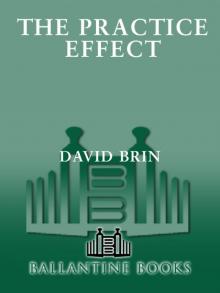 The Practice Effect
The Practice Effect Infinity's Shore
Infinity's Shore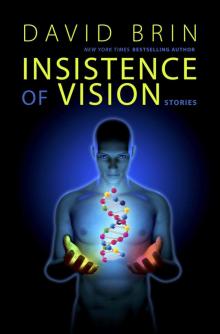 Insistence of Vision
Insistence of Vision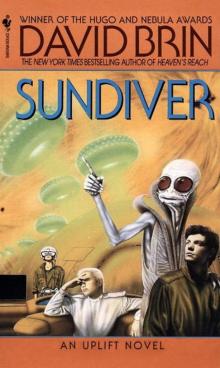 Sundiver
Sundiver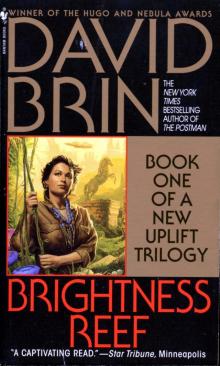 Brightness Reef
Brightness Reef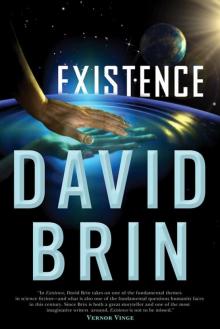 Existence
Existence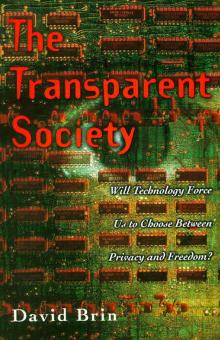 The Transparent Society
The Transparent Society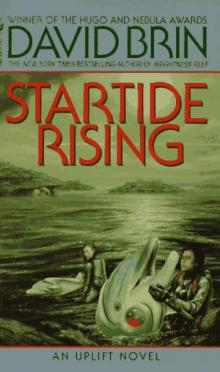 Startide Rising
Startide Rising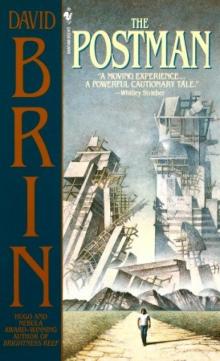 The Postman
The Postman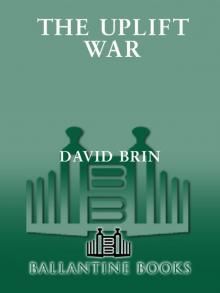 The Uplift War
The Uplift War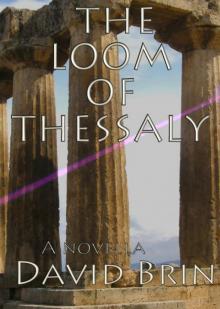 The Loom of Thessaly
The Loom of Thessaly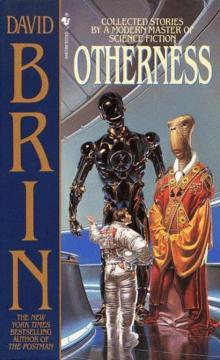 Otherness
Otherness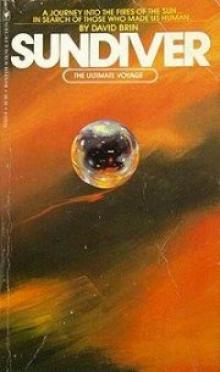 Sundiver u-1
Sundiver u-1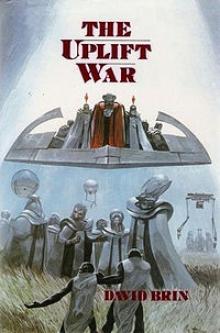 The Uplift War u-3
The Uplift War u-3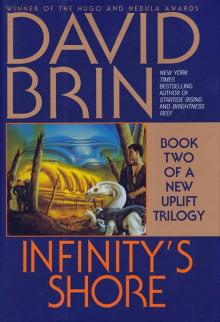 Infinity's Shore u-5
Infinity's Shore u-5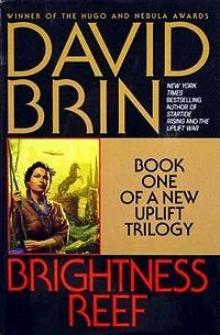 Brightness Reef u-4
Brightness Reef u-4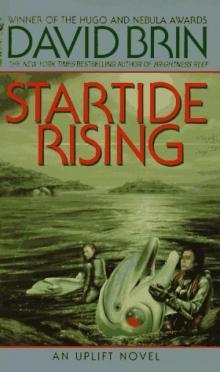 Uplift 2 - Startide Rising
Uplift 2 - Startide Rising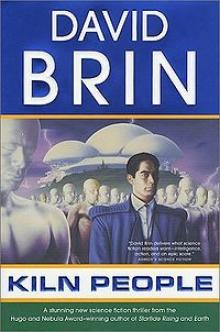 Kiln People
Kiln People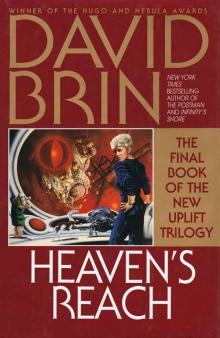 Heaven's Reach u-6
Heaven's Reach u-6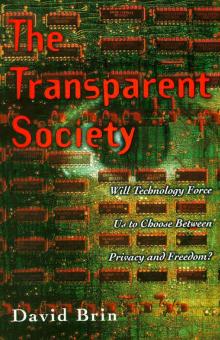 The Transparent Society: Will Technology Force Us to Choose Between Privacy and Freedom?
The Transparent Society: Will Technology Force Us to Choose Between Privacy and Freedom?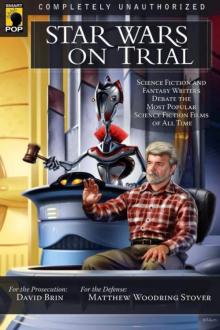 Star Wars on Trial
Star Wars on Trial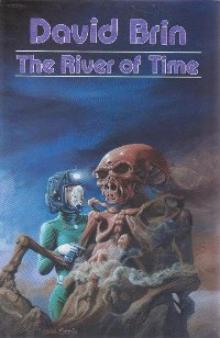 Lungfish
Lungfish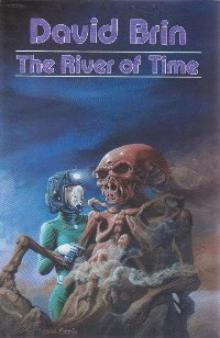 Tank Farm Dynamo
Tank Farm Dynamo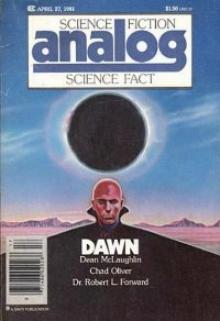 Just a Hint
Just a Hint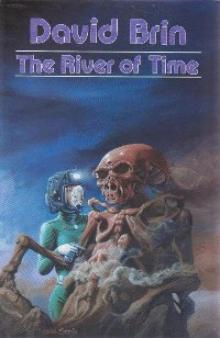 A Stage of Memory
A Stage of Memory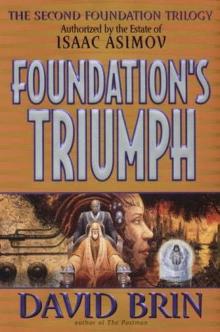 Foundation’s Triumph sf-3
Foundation’s Triumph sf-3 Thor Meets Captain America
Thor Meets Captain America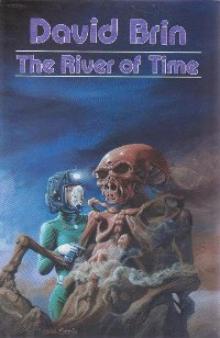 Senses Three and Six
Senses Three and Six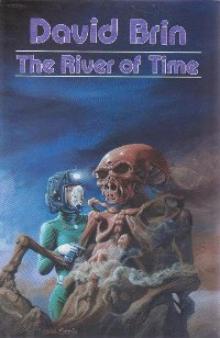 The River of Time
The River of Time Chasing Shadows: Visions of Our Coming Transparent World
Chasing Shadows: Visions of Our Coming Transparent World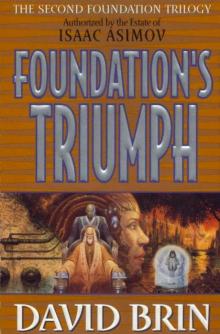 Foundation's Triumph
Foundation's Triumph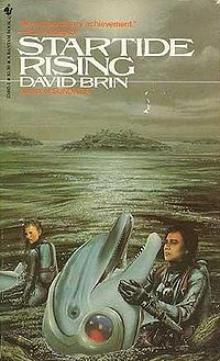 Startide Rising u-2
Startide Rising u-2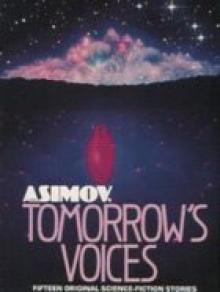 The Fourth Vocation of George Gustaf
The Fourth Vocation of George Gustaf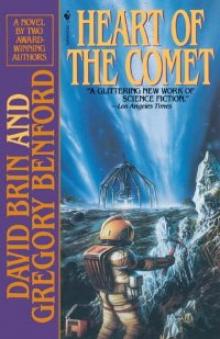 The Heart of the Comet
The Heart of the Comet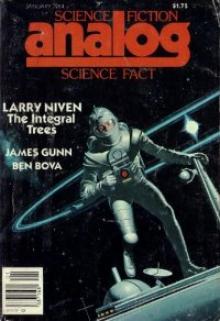 The Crystal Spheres
The Crystal Spheres